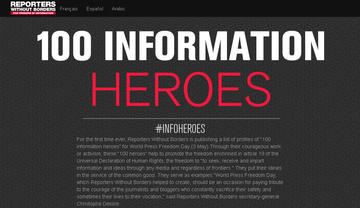
Two Italian and two Turkish journalists, plus one of each Bulgaria, Greece, Montenegro, Serbia and Slovenia have been named as "information heroes," along with 91 other media professionals and activists from across the globe
Less than a week ahead of World Press Freedom Day (May 3rd), Reporters Without Borders (RWB) published its first ever list of 100 Information Heroes, including also a brief profile of each of the journalists people named on it.
Through their courageous work or activism, they help to promote freedom of expression, as enshrined in article 19 of the Universal Declaration of Human Rights, namely "to seek, receive and impart information and ideas through any media and regardless of frontiers," the media watchdog said.
The people on what the organization described as a "non-exhaustive" list are men and women aged 25 to 75, from 65 countries in the world. Among them are Lirio Abbate and Giuseppe Maniaci of Italy, as well as Ismail Saymaz and Hasan Cemal of Turkey. The other journalists from Southeast Europe include Assen Yordanov (Bulgaria), Dina Daskalopoulou (Greece), Milka Tadic Mijovic (Montenegro), Brankica Stanković (Serbia), and Blaž Zgaga (Slovenia).
Some of them, like Maniaci and Saymaz, have been prosecuted numerous times, while Zgaga was facing a possible five-year prison sentence for disclosing "military secrets" until he was finally acquitted. Most of the others have been intimidated or threatened repeatedly. Death threats and the fact that he has been blacklisted by Cosa Nostra have not discouraged Abbate from doing his job, even under permanent police escort. Similarly, after receiving death threats and becoming the target of intimidation, Stanković, an investigative journalist, was placed under police protection.
"World Press Freedom Day… should be an occasion for paying tribute to the courage of the journalists and bloggers who constantly sacrifice their safety and sometimes their lives to their vocation," RWB secretary-general Christophe Deloire noted.
Questa pubblicazione è stata prodotta con il contributo dell'Unione Europea. La responsabilità sui contenuti di questa pubblicazione è di Osservatorio Balcani e Caucaso e non riflette in alcun modo l'opinione dell'Unione Europea. Vai alla pagina del progetto Safety Net for European Journalists. A Transnational Support Network for Media Freedom in Italy and South-east Europe.

 Italian, Balkan journalists on RWB list of "100 Information Heroes"
Italian, Balkan journalists on RWB list of "100 Information Heroes"




 Tutti i contenuti disponibili sul sito di Osservatorio Balcani e Caucaso sono distribuiti con licenza
Tutti i contenuti disponibili sul sito di Osservatorio Balcani e Caucaso sono distribuiti con licenza 